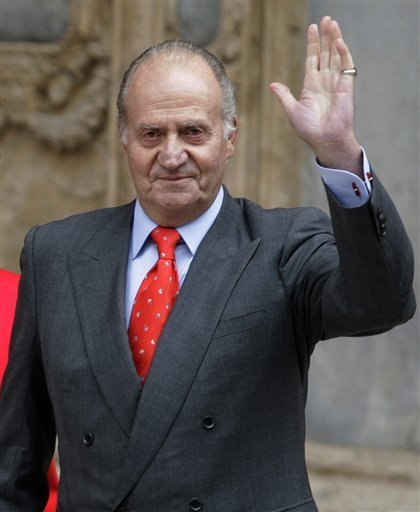King Felipe VI: Called to be a Symbol
In a turn of events that few would have predicted a fortnight ago, King Juan Carlos I of Spain (76) formally announced today his decision to put an end to his 39-year reign and abdicate in favour of Crown Prince Felipe (46). The decision follows three years of accelerated decline in the popularity of the Monarchy caused by family scandals and a series of major missteps by the King himself. The succession comes one week after the irruption into the Spanish political scene of Podemos (We Can), the leftist grassroots movement that obtained a stunning five seats and 1.2 million votes in the European Parliament elections on 25 May.

The rise of Podemos –created in March around a telegenic, fast-talking and pony-tailed university professor—crystallised the degree of dissatisfaction of a large sector of the Spanish electorate with the traditional political parties. Both the conservative Partido Popular, now in power in Madrid, and the Socialist Party lost millions of votes. More importantly, the poll marked the end of the de-facto bi-partisan system that has governed Spain since the restoration of democracy in 1976, where Conservatives and Socialists have alternated power for 35 years.
The upheaval caused by the election result has so far forced the resignation of Socialist Party leader, Alfredo Perez Rubalcaba, and opened an uncertain process to renew the party’s leadership. It has also signalled the pre-eminence, in number of votes, of the pro-independence ERC party in Catalonia over the more moderate CiU. But beyond specific effects, it has highlighted the ‘exhaustion’ –a term frequently used by political analysts—of the political framework that emerged after the death of General Francisco Franco in late 1975.
King Juan Carlos I, appointed by the dictator himself to preserve his regime, won the support of an overwhelming number of Spaniards by doing the opposite and championing the country’s rapid transformation into a constitutional democracy in the early days of his reign. His position was further enhanced when he aborted a military putsch in 1981. For years thereafter, the Monarchy served as a symbol –internally and internationally— of the ‘new’ Spain. However, the combined effect of the corruption trial against his son-in law, the fallout from the King’s elephant-hunting trip to Botswana at the height of the economic crisis and his alleged dalliance with a dubious German socialite have led to approval rates below 50% –and increasing calls for the abolition of the Monarchy.
Future King Felipe the Sixth has made efforts to disassociate himself from the reputation meltdown of the Crown. Over the past three years, as Juan Carlos has been in and out of hospitals, the Prince has raised his profile as a poised, articulate and socially-conscious, individual in tune with the times. At the same time, he has cultivated an image as a caring and modern family man, far removed from his father’s whispered reputation as a playboy and rumours about less-than-appropriate business deals.
During his televised abdication speech on Monday the King said that he took the decision to abdicate in January. This, however, contrasts with Juan Carlos’ own words during his last Christmas speech in which he affirmed his “determination” to continue discharging his duties. Whether carefully planned or forced by events, the royal transition acquires its full meaning only when examined in conjunction to the May 25 outcome. For the first time, a significant mass of voters channelled their opposition to EU mandated austerity, to rampant corruption among the traditional parties, to the financial system and to the Monarchy through a new “anti-system” political brand.
The ‘official’ Spanish body-politic –the main parties, the Government, the heads of key institutions, business leaders and academics— have tried to minimise the meaning of the ‘Podemos’ phenomenon and explain that its recent electoral showing cannot be extrapolated to upcoming municipal and general elections in 2015 and 2016. However, the Parliament that emerges as a result of the next general election is likely to confirm the decline of Conservatives and Socialists and further deconstruct the dominant statu quo.
Barely two hours after the abdication announcement, United Left leader Cayo Lara called for a referendum to abolish the Monarchy and social media exploded with calls for pro-Republic demonstrations. Regional groups favouring the independence of Catalonia and the Basque Country, as well as the new and radical movements like ‘Podemos’, are overtly or potentially anti-Monarchy and would have little choice but to support a potential groundswell for Spain’s transformation into a republic if public trust in the Crown is not restored.
The current Parliament –with a safe pro-Monarchy majority—will have to now take the constitutional steps to proclaim Prince Felipe as King, something that will most likely happen before the end of June. It is reasonable to think that Juan Carlos and his advisors have determined that a succession that is sure to be swiftly approved by the current Cortes will give the new King time to assert his own influence and project a totally new style.
In a country where emotions weigh heavily on voter’s choices, future King Felipe VI is faced with a daunting challenge: that of being a symbol of renewal. The question will be whether the institution he embodies –its reputation tarnished, its usefulness questioned— will regain the trust of Spaniards.
2 Comments
Find Out More
-
Generative AI is changing the search game
May 8, 2025
-
The challenges facing Europe and European leaders at Davos 2025
January 24, 2025



September 13, 2014 | 5:04 PM
Thank you! Your comment is awaiting moderation.
<strong>adjustable dumbbells cheap</strong> Public Affairs 2.0 » The most unexpected outcome of the rise of the leftist outsiders âPodemosâ
June 03, 2014 | 3:45 PM
RT @fleishmanEU: The most unexpected outcome of the rise of the leftist outsiders ‘Podemos’ - King Juan Carlos abdicates. See why at http:/…